Door Daan de Wit
Bekijk de video
onderaan dit artikel. Lees ook deel 2 van dit artikel (Engelstalig).
Saddam staat terecht voor zijn misdaden, zoals bijvoorbeeld de gifgasaanval in Halabja. Maar vandaag zal worden onthuld dat de VS in Irak vorigjaar de stad Fallujah hebben ingenomen met een variant van napalm. En uit onderzoek van de Sunday Herald blijkt dat Engeland componenten voor chemische wapens verkocht aan 26 landen, waaronder de 'as van het kwaad'. Sterker, zonder het Westen was er van een Saddam geen sprake, zo blijkt uit dit nieuwe artikel van DeepJournal.
De aanval op Halabja is volgens een rapport van het Pentagon uitgevoerd door Iran, schreven we al eerder. 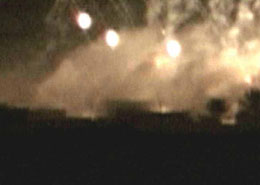 Toch is gifgas in Irak een realiteit, zo blijkt (Engelse vertaling) uit de documentaire Fallujah - The Hidden Massacre van het Italiaanse RAI News 24 gemaakt door Sigfrido Ranucci die vandaag op de Italiaanse televisie zal worden getoond (stream / WMV). 'In soldier slang they call it Willy Pete. The technical name is white phosphorus. In theory its purpose is to illumine enemy positions in the dark. In practice, it was used as a chemical weapon in the rebel stronghold of Fallujah. And it was used not only against enemy combatants and guerrillas, but again innocent civilians. The Americans are responsible for a massacre using unconventional weapons, the identical charge for which Saddam Hussein stands accused,' schrijft La Repubblica. Een moreel probleem dat ook in Engeland speelt, getuige deze kop: UK sells WMD components to ‘axis of evil’ countries. 'Two years ago, the Sunday Herald revealed the extent of the UK's sale of chemical weapons in an award-winning investigation into Britain's chemical bazaar. We revealed that some 26 countries – including Libya, Israel and Iran – were buying chemical weapon components from the UK. The UK has since upped the sale of these components', schrijft de krant medio vorig jaar. De VS scoren niet veel beter: 'As well as anthrax and botulism, the USA also sent [when Saddam was in power] West Nile fever, brucella melitensis, which damages major organs, and clostridium perfringens, which causes gas gangrene. [...] Other items which were sent by the US to Iraq included chemical warfare agent precursors, chemical warfare agent production facility plans and technical drawings, chemical warfare filling equipment, biological warfare-related materials, missile fabrication equipment and missile system guidance equipment', schrijft de Sunday Herald.
Toch is gifgas in Irak een realiteit, zo blijkt (Engelse vertaling) uit de documentaire Fallujah - The Hidden Massacre van het Italiaanse RAI News 24 gemaakt door Sigfrido Ranucci die vandaag op de Italiaanse televisie zal worden getoond (stream / WMV). 'In soldier slang they call it Willy Pete. The technical name is white phosphorus. In theory its purpose is to illumine enemy positions in the dark. In practice, it was used as a chemical weapon in the rebel stronghold of Fallujah. And it was used not only against enemy combatants and guerrillas, but again innocent civilians. The Americans are responsible for a massacre using unconventional weapons, the identical charge for which Saddam Hussein stands accused,' schrijft La Repubblica. Een moreel probleem dat ook in Engeland speelt, getuige deze kop: UK sells WMD components to ‘axis of evil’ countries. 'Two years ago, the Sunday Herald revealed the extent of the UK's sale of chemical weapons in an award-winning investigation into Britain's chemical bazaar. We revealed that some 26 countries – including Libya, Israel and Iran – were buying chemical weapon components from the UK. The UK has since upped the sale of these components', schrijft de krant medio vorig jaar. De VS scoren niet veel beter: 'As well as anthrax and botulism, the USA also sent [when Saddam was in power] West Nile fever, brucella melitensis, which damages major organs, and clostridium perfringens, which causes gas gangrene. [...] Other items which were sent by the US to Iraq included chemical warfare agent precursors, chemical warfare agent production facility plans and technical drawings, chemical warfare filling equipment, biological warfare-related materials, missile fabrication equipment and missile system guidance equipment', schrijft de Sunday Herald.
Franse militaire en nucleaire hulp voor Saddam
In de jaren zestig 'alarmed by the sight of President Abdel-Karim Qassem cosying up to Moscow and threatening to nationalise Iraq's oil industry' helpt de CIA de Baathpartij aan de macht en zet Saddam op de loonlijst (zie deel 3 in deze serie). Ook voorzien de VS het regime van 6000 bommen, waarvan 1000 napalmbommen, om de Koerden te onderdrukken, schrijft Le Monde diplomatique. (Na de eerste Golfoorlog slaat Saddam een door George Bush opgeroepen opstand onder de Koerden neer, onder het toeziend oog van de VS, zie deze DeepJournal). Alsof de Amerikaanse napalm niet schadelijk genoeg is, komt Frankrijk Irak te hulp met nucleaire reactors. 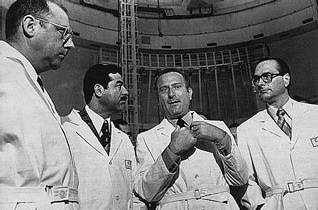 The Telegraph schrijft: 'In 1975, [Saddam] visited France and Jacques Chirac, then prime minister, took him on a tour of Provence. M Chirac went on to sell Saddam a nuclear reactor for £2 billion and signed a Nuclear Co-operation Treaty. This agreement bound Paris to help Saddam's nuclear programme and also excluded "all persons of Jewish origin" from participating, whether in France or Iraq. M Chirac insisted that the nuclear reactor and technical help were for civilian purposes. Saddam was more honest. "The agreement with France is the first concrete step toward production of the Arab atomic bomb," he said.' 'They negotiated the sale to Iraq of two French nuclear reactors. One of them was destroyed in an air raid [Operation Opera] by the Israelis in 1981 amid fears that Iraq was developing a nuclear weapon. France also agreed to provide Iraq with 133 Mirage F1 jet fighters over a 10-year period. It is reckoned that during the 1980s, 40% of France's arms exports went to Iraq', schrijft de BBC. In de documentaire Saddam Hussein : Le procès que vous ne verrez pas uitgezonden bij Panorama (Canvas) op 16 oktober 2005 als Het proces dat de wereld niet zal zien -en gemaakt door de schrijvers van het genoemde artikel in Le Monde diplomatique- zegt UPI Terrorism Correspondent Richard Sale dat, omdat de Iraki's nog aan het leren waren hoe te vliegen in de Mirages, Franse piloten missies vlogen voor Irak tegen Iran. Journalist Joe Trento zegt in de documentaire dat Iraakse soldaten in de VS zijn getraind door de groene baretten in guerilla-tacktieken.
The Telegraph schrijft: 'In 1975, [Saddam] visited France and Jacques Chirac, then prime minister, took him on a tour of Provence. M Chirac went on to sell Saddam a nuclear reactor for £2 billion and signed a Nuclear Co-operation Treaty. This agreement bound Paris to help Saddam's nuclear programme and also excluded "all persons of Jewish origin" from participating, whether in France or Iraq. M Chirac insisted that the nuclear reactor and technical help were for civilian purposes. Saddam was more honest. "The agreement with France is the first concrete step toward production of the Arab atomic bomb," he said.' 'They negotiated the sale to Iraq of two French nuclear reactors. One of them was destroyed in an air raid [Operation Opera] by the Israelis in 1981 amid fears that Iraq was developing a nuclear weapon. France also agreed to provide Iraq with 133 Mirage F1 jet fighters over a 10-year period. It is reckoned that during the 1980s, 40% of France's arms exports went to Iraq', schrijft de BBC. In de documentaire Saddam Hussein : Le procès que vous ne verrez pas uitgezonden bij Panorama (Canvas) op 16 oktober 2005 als Het proces dat de wereld niet zal zien -en gemaakt door de schrijvers van het genoemde artikel in Le Monde diplomatique- zegt UPI Terrorism Correspondent Richard Sale dat, omdat de Iraki's nog aan het leren waren hoe te vliegen in de Mirages, Franse piloten missies vlogen voor Irak tegen Iran. Journalist Joe Trento zegt in de documentaire dat Iraakse soldaten in de VS zijn getraind door de groene baretten in guerilla-tacktieken.
VS verleidden Irak tot oorlog tegen Iran
Militaire hulp volgde
In dezelfde documentaire wordt onthuld wat vooraf ging aan de aanval van Irak op Iran, op 22 september 1980. 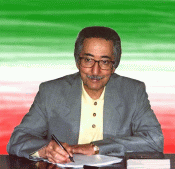 Voormalig premier van Iran, Abdolhassan Bani Sadr, zegt in de documentaire dat in een hotel in Parijs plannen zijn gepresenteerd door de VS aan Irak waarin het gemak werd overdreven van een aanval en een overwinning op Iran. Richard Sale bevestigt dit in de documentaire. 'A top-secret US government document from 1984 reveals that "President Carter gave the Iraqis a green light to launch the war against Iran"', schrijft Le Monde diplomatique: 'He [Bani Sadr] claims that Iranian secret services acquired a copy of this plan which, according to his sources, had been drawn up by the Iraqis and Americans in a Paris hotel . "I'll tell you why I know it's genuine: because the Iraqis conducted the war exactly according to this battle plan. It was only because we had a copy that we were able to withstand their attacks". [...] Several former senior US diplomatic officials have admitted to Richard Sale that the US contributed to the battle plan.'
Voormalig premier van Iran, Abdolhassan Bani Sadr, zegt in de documentaire dat in een hotel in Parijs plannen zijn gepresenteerd door de VS aan Irak waarin het gemak werd overdreven van een aanval en een overwinning op Iran. Richard Sale bevestigt dit in de documentaire. 'A top-secret US government document from 1984 reveals that "President Carter gave the Iraqis a green light to launch the war against Iran"', schrijft Le Monde diplomatique: 'He [Bani Sadr] claims that Iranian secret services acquired a copy of this plan which, according to his sources, had been drawn up by the Iraqis and Americans in a Paris hotel . "I'll tell you why I know it's genuine: because the Iraqis conducted the war exactly according to this battle plan. It was only because we had a copy that we were able to withstand their attacks". [...] Several former senior US diplomatic officials have admitted to Richard Sale that the US contributed to the battle plan.'
Daar hield de steun niet op: 'Although Washington was officially neutral in the Iran - Iraq war , a US commission of inquiry has revealed that the White House and the CIA secretly supplied weapons, including fragmentation bombs, to Saddam Hussein. US satellite intelligence allowed Irani an troops to be more effectively targeted; Washington was aware that Iraqi units were using chemical weapons. According to Rick Francona, then an officer with US military intelligence, the lists of bombing targets he gave Iraqis in 1988 secured Iraq 's final victory over Iran'.
Westerse landen verleenden steun aan Irak
Bush steunde Iran en daarmee zichzelf
'In 1987, a French paper published a letter written to Saddam Hussein by Jacques Chirac a few months previously. It began: "My dear friend." [...] many other Western countries - including the United States, Britain, West Germany and Italy - also helped Iraq with equipment and expertise, both civilian and military, and with finance.' Dit allemaal uit angst voor Iran. 'In the early 1980s, the bogeyman for the Americans was Ayatollah Khomeini. He had come to power in Iran during the 1979 Islamic revolution.' Dit verklaart de steun, ook van de VS, voor Irak, die ondermeer uitliep in het bezoek (zie deel 2 van deze serie) van 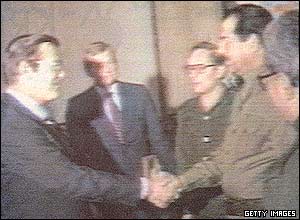 Rumsfeld aan Saddam: 'President Reagan determined nevertheless that Iraq should be supported and he sent Mr Rumsfeld to Baghdad with a personal letter from himself to Saddam Hussein', schrijft de BBC. Reagan was inmiddels president omdat Carter in 1980 de verkiezingen had verloren vanwege zijn afhandeling van de gijzeling van de Amerikaanse ambassade in Teheran. Geheel tegen het anti-Iraanse Amerikaanse belang in, werd Iran in 1980 in het diepste geheim van wapens en geld voorzien door George Bush, de vader van W. Bush. De wapens en het geld werden gedoneerd in ruil voor het langer vasthouden van de Amerikaanse gijzelaars. Het doel van deze operatie October Surprise was dat Carter de gijzelaars niet vrij kon krijgen en Reagan verkozen zou worden (en Bush vice-president zou worden). Aldus geschiedde. Lees er meer over in dit artikel van DeepJournal voor Esquire.
Rumsfeld aan Saddam: 'President Reagan determined nevertheless that Iraq should be supported and he sent Mr Rumsfeld to Baghdad with a personal letter from himself to Saddam Hussein', schrijft de BBC. Reagan was inmiddels president omdat Carter in 1980 de verkiezingen had verloren vanwege zijn afhandeling van de gijzeling van de Amerikaanse ambassade in Teheran. Geheel tegen het anti-Iraanse Amerikaanse belang in, werd Iran in 1980 in het diepste geheim van wapens en geld voorzien door George Bush, de vader van W. Bush. De wapens en het geld werden gedoneerd in ruil voor het langer vasthouden van de Amerikaanse gijzelaars. Het doel van deze operatie October Surprise was dat Carter de gijzelaars niet vrij kon krijgen en Reagan verkozen zou worden (en Bush vice-president zou worden). Aldus geschiedde. Lees er meer over in dit artikel van DeepJournal voor Esquire.
VS verleidden Irak tot oorlog tegen Koeweit
'The war with Iran [van 1980 tot 1988] had saddled Iraq with £50 billion of debts and a reconstruction bill exceeding £140 billion. By 1989, Saddam's creditors were taking over half of his oil revenues', schrijft The Telegraph. In ieder geval een deel van het geld, zes miljard dollar, is getraceerd, via Rome naar de VS. Maar belangrijker is dat net in die periode na de oorlog Koeweit meer olie ging produceren, zo blijkt uit de documentaire Hidden Wars of Desert Storm. 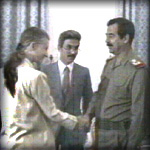 Ongunstig voor Saddams olieprijs en meer nog, een deel van die olie was afkomstig uit Irak: 'Using equipment bought from National Security Council chief Brent Scowcroft's old company, Kuwait was pumping out some $14-billion worth of oil from underneath Iraqi territory. Even the territory they were drilling from had originally been Iraq's', zo blijkt uit het boek The CIAs Greatest Hits. Toen Saddam vervolgens Koeweit wilde inlijven, gaf de Amerikaanse ambassadeur April Glaspie in Irak aan Saddam in feite het groene licht. Om vervolgens de mogelijkheden voor oorlog tegen Irak compleet te maken werden de Saudi's door de VS gefopt met getrukeerde foto's die Iraakse troepen lieten zien aan de grens met Koeweit (zie deze DeepJournal). Vervolgens werd de wereld gefopt door een mediacampagne die bedacht door van een PR-bureau (zie deze DeepJournal).
Ongunstig voor Saddams olieprijs en meer nog, een deel van die olie was afkomstig uit Irak: 'Using equipment bought from National Security Council chief Brent Scowcroft's old company, Kuwait was pumping out some $14-billion worth of oil from underneath Iraqi territory. Even the territory they were drilling from had originally been Iraq's', zo blijkt uit het boek The CIAs Greatest Hits. Toen Saddam vervolgens Koeweit wilde inlijven, gaf de Amerikaanse ambassadeur April Glaspie in Irak aan Saddam in feite het groene licht. Om vervolgens de mogelijkheden voor oorlog tegen Irak compleet te maken werden de Saudi's door de VS gefopt met getrukeerde foto's die Iraakse troepen lieten zien aan de grens met Koeweit (zie deze DeepJournal). Vervolgens werd de wereld gefopt door een mediacampagne die bedacht door van een PR-bureau (zie deze DeepJournal).
Leugen en bedrog als wapen tegen Saddam en de rest van de wereld
Kort na het 'einde' van de Irakoorlog in 2003 schrijft Slate over 'Centcom's real secret weapon' in de Irakoorlog: niet zozeer slimme bommen, als wel slimme omkopingen: 'A fascinating piece in the May 19 Defense News quotes Gen. Tommy Franks, chief of U.S. Central Command, confirming what had until now been mere rumors picked up by dubious Arab media outlets—that, before Gulf War II began, U.S. special forces had gone in and bribed Iraqi generals not to fight.' Frank Kaplan van Slate vraagt zicht af of onder de omgekochte manschappen ook de commandanten zaten die op de audiotapes te horen waren die toenmalig minister van 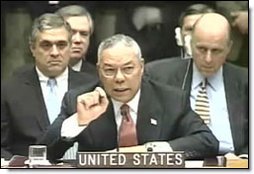 Buitenlandse Zaken Colin Powell liet horen tijdens zijn optreden in de Veiligheidsraad, februari 2003. Van een van hen zegt Powell te weten dat het een generaal is; toch zijn de sprekers op de tapes verder nooit geïdentificeerd.
Buitenlandse Zaken Colin Powell liet horen tijdens zijn optreden in de Veiligheidsraad, februari 2003. Van een van hen zegt Powell te weten dat het een generaal is; toch zijn de sprekers op de tapes verder nooit geïdentificeerd.
Achteraf moet zijn optreden worden gezien als misleidend; Powell had er tijdens de voorbereidingen al moeite mee, schijnt het, zo schrijft USNews: 'At one point during the rehearsal, Powell tossed several pages in the air. "I'm not reading this," he declared. "This is bulls- - -."' Powell ging toch naar de Veiligheidsraad en inmiddels heeft hij spijt. ABC schrijft naar aanleiding van een interview dat Powell had met Barbara Walters: 'When asked if he feels it has tarnished his reputation, he said, "Of course it will. It's a blot. I'm the one who presented it on behalf of the United States to the world, and [it] will always be a part of my record. It was painful. It's painful now."'
James-Bondregisseur maakte speelfilm voor Saddam
Saddam omkopen was niet goed mogelijk, want hij was niet geïnteresseerd in geld,
schrijft The Atlantic Monthly in mei 2002: 'What does Saddam want? By all accounts, he is not interested in money. This is not the case with other members of his family. His wife, Sajida, is known to have gone on million-dollar shopping sprees in New York and London, back in the days of Saddam's good relations with the West. Uday drives expensive cars and wears custom-tailored suits of his own design. Saddam himself isn't a hedonist; he lives a well-regulated, somewhat abstemious existence. He seems far more interested in fame than in money, desiring above all to be admired, remembered, and revered. A nineteen-volume official biography is mandatory reading for Iraqi government officials, and Saddam has also commissioned [in 1980] a six-hour
film about his life, called The Long Days, which was edited [and directed] by
Terence Young, best known for directing three James Bond films. Saddam told his official biographer that he isn't interested in what people think of him today, only in what they will think of him in five hundred years. The root of Saddam's bloody, single-minded pursuit of power appears to be simple vanity.'
-
Het is altijd goed als een boef wordt opgepakt, helemaal als hij de leider is van een stel andere boeven. Maar wat als het gaat om een boef die terecht staat terwijl zijn terechtstaan niet het doel was, maar moet worden gezien als bijvangst? Wat als de bijvangst het resultaat is van een expeditie die door leugen en bedrog is gerealiseerd? Wat als de buit binnen is en de bijvangst met dezelfde leugen en bedrog wordt gepresenteerd als hoofddoel? Wat als dat hoofddoel zijn bestaansrecht ontleent aan hen die hem nu veroordelen? Het wemelt in de wereld van de boeven. Al die boeven hebben recht op een veroordeling, niet alleen de door de VS gecreëerde bijvangst.
Blijkens zijn banden met het Westen heeft Saddam veel te vertellen. Nu
een [Nov. 10: en een
tweede] van zijn advocaten is
vermoord,
wil zijn verdediging hem uit veiligheidsoverwegingen in het buitenland laten berechten, bijvoorbeeld in Den Haag. Maar de president van het internationale strafhof
zegt dat de regels dit niet toestaan.
Fallujah - The Hidden Massacre




 Toch is gifgas in Irak een realiteit, zo
Toch is gifgas in Irak een realiteit, zo  The Telegraph
The Telegraph  Voormalig premier van Iran, Abdolhassan Bani Sadr, zegt in de documentaire dat in een hotel in Parijs plannen zijn gepresenteerd door de VS aan Irak waarin het gemak werd overdreven van een aanval en een overwinning op Iran. Richard Sale bevestigt dit in de documentaire. 'A top-secret US government document from 1984 reveals that "President Carter gave the Iraqis a green light to launch the war against Iran"',
Voormalig premier van Iran, Abdolhassan Bani Sadr, zegt in de documentaire dat in een hotel in Parijs plannen zijn gepresenteerd door de VS aan Irak waarin het gemak werd overdreven van een aanval en een overwinning op Iran. Richard Sale bevestigt dit in de documentaire. 'A top-secret US government document from 1984 reveals that "President Carter gave the Iraqis a green light to launch the war against Iran"',  Rumsfeld aan Saddam: 'President Reagan determined nevertheless that Iraq should be supported and he sent Mr Rumsfeld to Baghdad with a personal letter from himself to Saddam Hussein',
Rumsfeld aan Saddam: 'President Reagan determined nevertheless that Iraq should be supported and he sent Mr Rumsfeld to Baghdad with a personal letter from himself to Saddam Hussein',  Ongunstig voor Saddams olieprijs en meer nog, een deel van die olie was afkomstig uit Irak: 'Using equipment bought from National Security Council chief Brent Scowcroft's old company, Kuwait was pumping out some $14-billion worth of oil from underneath Iraqi territory. Even the territory they were drilling from had originally been Iraq's', zo
Ongunstig voor Saddams olieprijs en meer nog, een deel van die olie was afkomstig uit Irak: 'Using equipment bought from National Security Council chief Brent Scowcroft's old company, Kuwait was pumping out some $14-billion worth of oil from underneath Iraqi territory. Even the territory they were drilling from had originally been Iraq's', zo  Buitenlandse Zaken Colin Powell liet horen tijdens zijn
Buitenlandse Zaken Colin Powell liet horen tijdens zijn